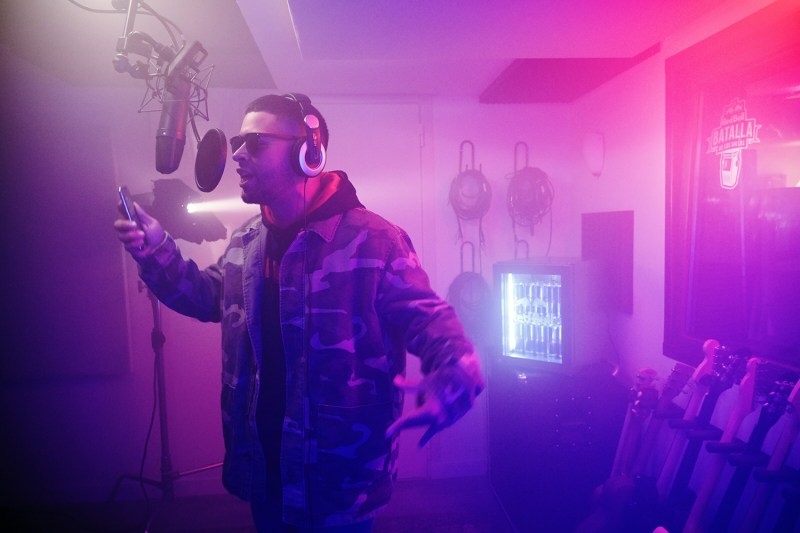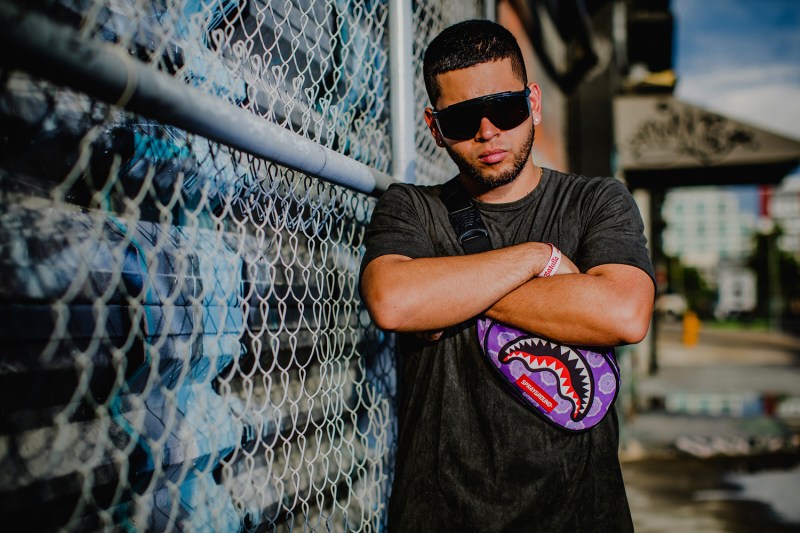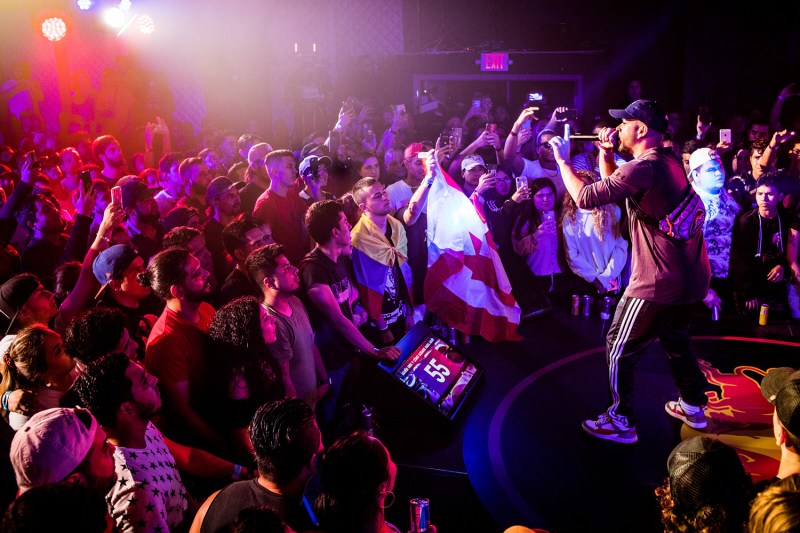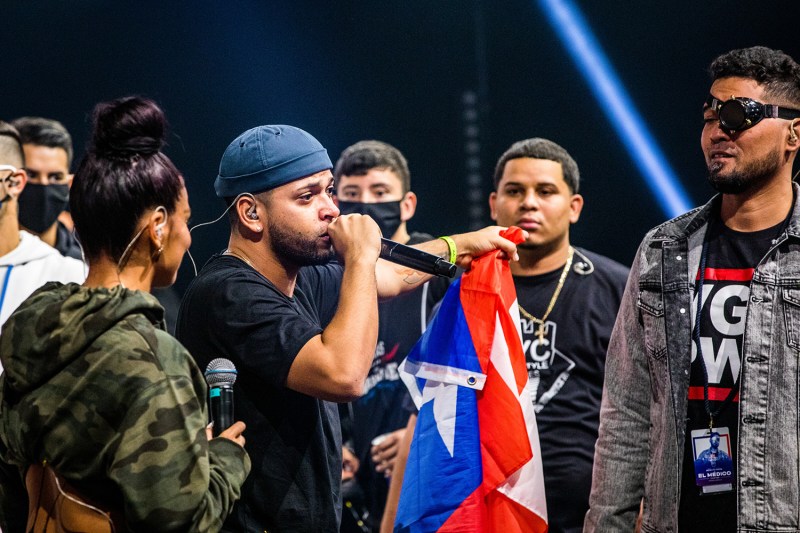
When Yartzi attends Red Bull Batalla’s U.S. qualifiers on August 13 over Twitch, the two-time U.S. champ is, ironically, a man without a country. With a move to Miami in October from his native Puerto Rico, the 27-year-old rap battle great (think 8 Mile in Spanish) bid his home goodbye, and there’s a clear reason why: “You raise a rock [in Puerto Rico] and you find 15 good reggaeton artists,” he tells The Manual. “Hip-hop is not viewed as entertainment, but I think that can change.”
Yartzi, Zooming in from his sparse, monochromatic apartment in South Florida, dresses in grays, a matching hooded sweatshirt and ball cap. He’s equally understated in tone: Earnest, workmanlike, and without the affectations of a hip-hop star. Born to artistically inclined parents with normal jobs, the former William Giovanni Manzano Serrano says his stage name comes from the way his mother described his interests in poetry and music to others; as her “artsy” child. Add a Y to the top, swap in a Z, and he liked the way it sounded.
Related Guides
Along with his interest in the written word, Yartzi was obsessed with music from a young age thanks to an older brother feeding him hip-hop via CD and his mother’s casual musicianship. But his hometown of Ponce, a crossroads of genres for generations, also had an effect. Tempo, which Yartzi describes as “one of the most influential Spanish-speaking rappers in history,” calls the city home and hails from Yartzi’s own barrio, while the late salsa vocalist Héctor Lavoe spent much of his career in the southern metropolis.

But starting before Yartzi’s birth, reggaeton was supplanting the older salsa and choking out early New York hip-hop inroads, becoming the dominant genre on the island by the Aughts and spreading throughout Latin America. (In another example of irony, it was Daddy Yankee, a Puerto Rican hip-hop artist, who coined the new genre’s name in 1991 and became its first breakout star.) And that’s where it remains: Reggaeton dominates domestic Puerto Rican stages, siphons off press attention, and continues as its largest musical export, including its most recent mainstream crossover acts like Luis Fonsi’s “Despacito” and Bad Bunny’s singsongy reggaeton-meets-Drake hybrid style. Yartzi makes the analogy of a single restaurant in town: Of course, everyone’s going to go there; it’s literally the only choice. “People think that they have to wait for the people to want [other genres] to feed them that,” he says. “That’s what we need: More outlets and more opportunities for hip-hop.”
It’s no surprise, then, that Yartzi has found his greatest success far from his home, and his recent move to Miami was, in a sense, inevitable. But his skill’s seed was nurtured by the very organization in which he’s found notoriety: Red Bull Batalla de los Gallos, a Spanish rap-battle series that this year celebrates its 15th anniversary, staged its first contest in Puerto Rico in 2005. Yartzi was there at its start, age 10 or 11, front and center. “It was underground in the underground, you know?” he says. Years later and committed to hip-hop as a career, he returned to its orbit with cold calculation and burning ambition.
“I see it as a sport, more than anything,” he says, “a herramienta, a tool.”

For those with the right stuff, rap battles can be a means of achieving recognition in an industry that has so many external factors. It doesn’t matter if you don’t have a big marketing budget or the attention of an A&R rep or a five-figure home studio; if you slay all comers on a hot mic, you’ll get eyeballs — and ears. “In battle, you just have to beat ‘em up, one by one,” Yartzi says. “The way to the top is a lot faster.”
The battles, which pit MC against MC in a high-pressure, audience-fueled setting, are flooded with adrenaline. Competition spurs creativity, and combatants vibe off each other the way jazz musicians might, call-and-response flows in 12, 16, 20 bars at a time. “It’s a rush to create something better than [the other MC],” Yartzi says. But therein lies the discipline’s limitations: Its improvisational nature doesn’t allow for nuance, introspection, fully flexed creativity. “People who listen, they can get a glimpse of who you are and your beliefs based on your rapping,” he says. “But it’s hardly possible to express yourself.”
Because of his rap-battle pedigree, the few tracks that Yartzi has released through streaming platforms are heavily lyrically based, more akin to Mobb Deep or Wu-Tang Clan than Southern mumble-rap or trap. A debut EP, which Yartzi says he plans to release in January and February of 2022, will no doubt feature the same rhythmic mastery that’s brought him to international consciousness. But he’s also quick to express his admiration for his island’s homegrown genre and largest export, as well as a desire to move in and out of it at will. “There’s a specific line drawn between reggaeton and rap, and that line should never have existed,” he says. “You can’t have a war on a genre.”

An EP, for any artist, is an ambitious undertaking, but Yartzi has even loftier goals: To unite the underground hip-hop scene of Puerto Rico with its more renowned reggaeton brethren. As they were close at the beginning with Yankee, so shall they be in the future, forever and ever, amen: “I’m going back to that mindset, and I’m taking people to that time where there wasn’t a gap,” he says.
As the defending U.S. Batalla champ, he has an automatic berth in the finals, which take place on September 18 live in Los Angeles. From there, should he advance, the World Finals take place in December at an as-yet-named location, where national champions from the U.S., Mexico, Spain, Colombia, and elsewhere meet head to head. Last year, Yartzi advanced to the second round, where he was eliminated by eventual world champ Rapder, of Mexico.
“It’s not easy,” he says of the U.S.-based competition, and it’s made more difficult in that he’s a native Puerto Rican. “You’re an outsider,” he says, “and they treat you that way.”
At the vanguard of his U.S. territory’s hip-hop scene and often its sole representative on the international stage, Yartzi is no stranger to piloting a boat beating against the tide. But the tide seems to be changing.
In the U.S. qualifiers this year, there are four other Puerto Ricans, and it gives Yartzi hope. “I have to look at the bigger picture, the greater good,” he says. “I’ll do it. I’ll do it any day.
“It’s a responsibility that life gave to me,” he says, “and I look forward to it every day.”



